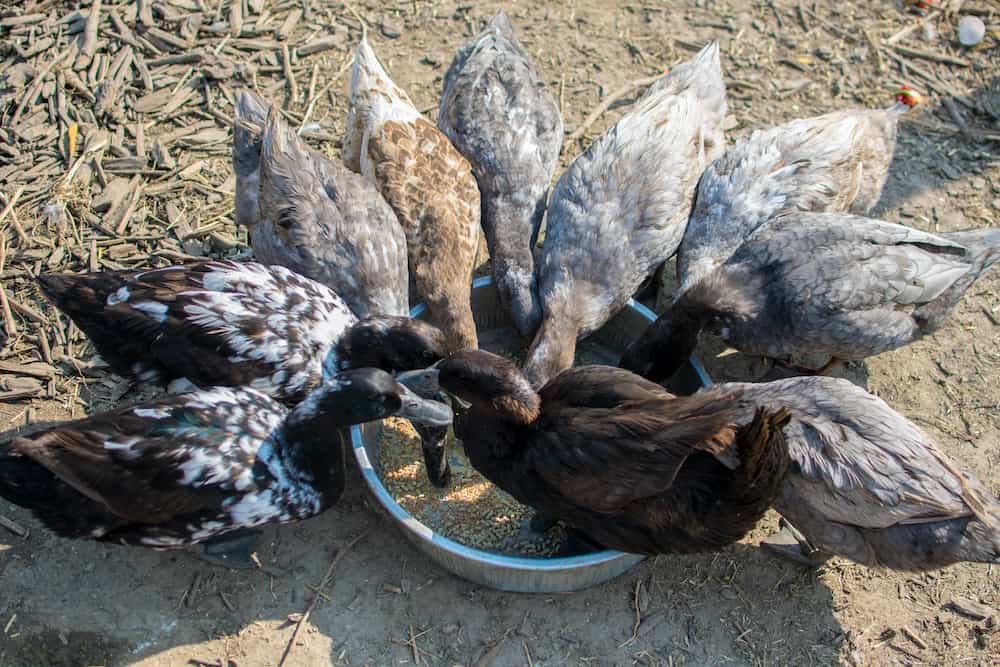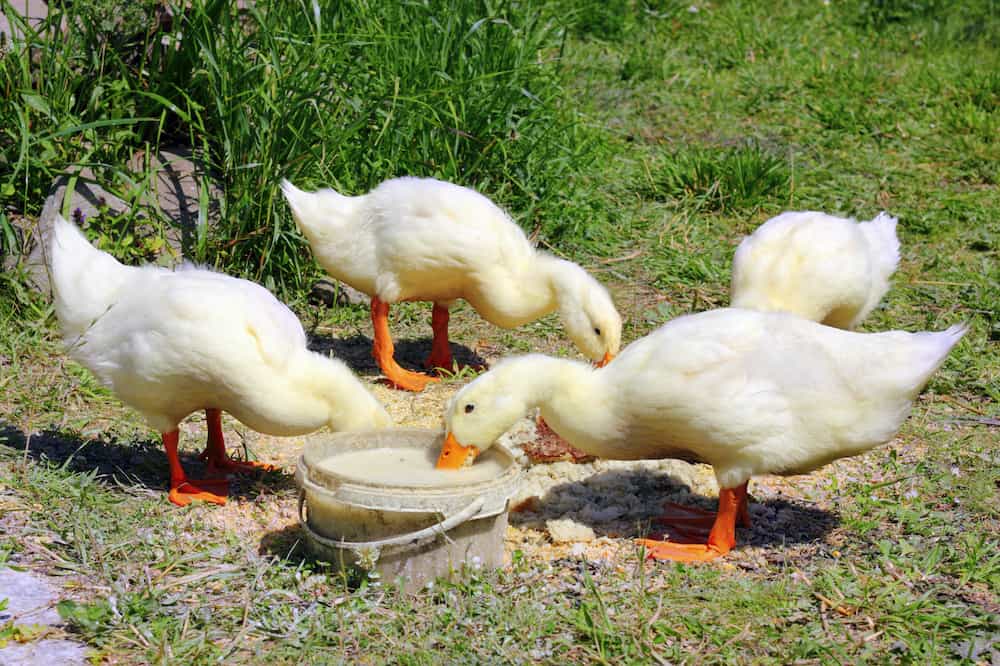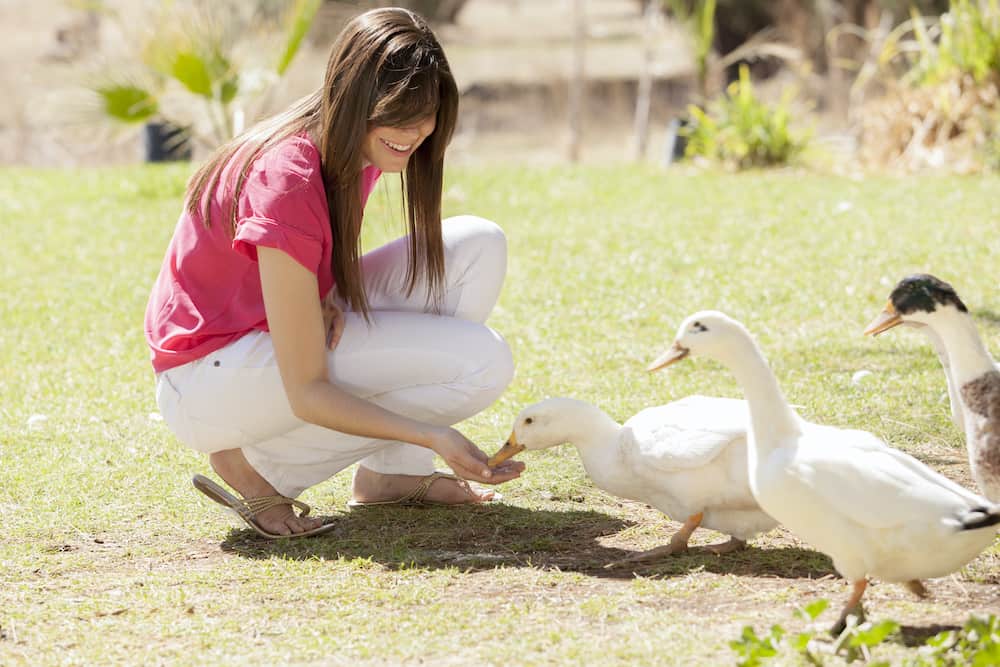Can ducks eat chicken feed? When raising ducks and chickens together, it’s important to know if they can share feed and eat the same foods. They have certain nutritional requirements, and duck feeds are designed to meet those needs. It’s important to know what do ducks eat.
When raising ducks for the first time, it’s important to know if ducks can eat chicken feed and can ducklings eat chick starter. This includes starter, grower, finisher, and breeder feeds.
As such, let’s talk about a duck’s dietary needs and compare it to a chicken’s nutritional requirements to find out. It’s important to have the right diet for the right bird. We’ll also provide you a list of what you can and cannot feed your ducks.
Can ducks eat chicken feed?
When raising ducks, it would be convenient to feed ducks chicken feed, especially if this is what you have on hand. If your chickens and ducks free range together, it’s also important to know.
Chicken feed contains a mixture of nutrients and minerals that are also beneficial to a duck’s health. However, it doesn’t have the exact nutritional balance for ducks.
Can Baby Ducks Eat Chick Starter?
It’s best to use feed that is made for ducks. Choose feed that is high quality without a lot of by-product ingredients. You want your ducks to have optimum nutrition. With it, they can have poor feathering, lower body weight, reduced egg production, and more.
When you choose quality feed from a reputable dealer, you will help ensure you’re raising healthy ducks.
When considering what to feed ducklings, it’s best to feed ducklings with waterfowl starter crumbles for their first three weeks of life. If you can’t find crumbles, which are small and safe for ducklings to consume, you can buy pellets.
If that isn’t an option, you can feed your ducklings with a chick starter, but should only do so for the first two weeks.
Beyond that, you should switch their feed to a lower-protein grower feed, until they’re around 18 weeks old.
What Are the Dangers of Chicken Feed for Ducks?
Technically, a more accurate answer to can ducks eat chicken food is yes, but you shouldn’t rely on it as a long-term feed solution.
Chicken feed contains high amounts of protein, which helps chickens grow faster and optimizes their egg production. On the contrary, too much protein is not good for ducks in the long-term.
You also shouldn’t rely on chicken feed for your ducks since they need more niacin in their diet than chickens do, which the feed won’t provide.
Too Much Protein
If baby ducks grow too fast from eating too much protein, they can develop foot and leg problems. It can also cause ducks and ducklings to develop “angel wing”, a condition in which the ducks’ feathers turn outwards. This condition will prevent them from flying and migrating.
Lack of Niacin
Vitamin B3 or niacin is not stored in the body, and ducks need a high amount of it to stay healthy. That means they need high levels of niacin in their feed to ensure they’re ingesting it regularly.
Niacin is particularly important when ducklings are developing. Chicks, on the other hand, don’t need the same levels of niacin in their diet, so their food won’t contain it.
If you want to use it short-term or for the first two weeks of a duckling’s life, you should mix it with around 5% brewers yeast for extra niacin.
How to Use Chick Starter for Ducks
If it’s cost prohibitive to buy duck feed, you can use chicken feed as an alternative. You can use a 23% protein chick starter for the first 2 weeks, followed by a 20% protein broiler grower diet.
Another option is using a broiler finisher diet containing 18% protein. However, you must do this with care and caution. Oftentimes broiler chicken feed contains feed medications that do not have the Food and Drug Administration’s approval for ducks.
If you want to use chick starter instead, while it’s not preferred, you can make it work.
Here is how you can make chick starter feed more suitable for your baby duckling’s needs.
Weeks One and Two
Since your ducklings need more niacin at this age, you can add the following in your chick starter before feeding it to them:
-
Brewer’s Yeast
The most popular and easiest method of supplementing a duckling’s diet with niacin is to mix some brewer’s yeast into the chick starter. This yeast is used for brewing beer and making bread, but many people also take it to boost immune and digestive health.
You can buy it from natural food stores, health food stores, and online. What you need to do is mix 1.5 tablespoons into each cup of chick starter feed you give your ducklings.
Brewer’s yeast is powdery, so pour it on top of the feed to ensure that your ducklings get some of it before it all settles at the bottom of the pile.
Some people will wet a good amount of the feed so that the powder sticks to it. Just note that wetting it too much or at once could make the mixture moldy and inedible if they don’t eat it right away.
-
Liquid Niacin Supplement
Being a water-soluble vitamin, you can add niacin to a ducklings diet by buying liquid niacin and putting it in their water. You’ll need to add around 500mg of niacin to every four gallons of water.
If it looks like a particular duckling is struggling, you might need to administer 10mg to 20mg daily to that particular bird to make sure it’s getting enough.
However, it can still be very tricky since ducks love to splash around. You never know how much water could be wasted.
-
Niacin Capsules
You can also buy vitamin B3 in capsule form, so if you can’t find the liquid, just break open the capsules and mix them into your ducklings’ water.
From Weeks Two – 20
When your ducklings are around two to three weeks old, they just start growing faster. That doesn’t mean they need more protein; in fact, it’s quite the opposite. This is when you should be switching them onto a lighter protein feed.
If you can’t find a chick starter with 16% to 18% protein, you can bulk it out with uncooked, rolled oats.
You’ll want to use enough oats to make the feed contain around 20% oats in total. You’ll also need to carry on supplementing their diet with niacin, as described above.
Continue supplementing your ducklings’ diet in these two ways until they are at least 20 weeks old, at which point you can switch them onto layer feed.

What Can Ducks Eat?
If your ducks are free-range, ducks can eat all sorts of things they forage from around the garden, such as grass, weeds, and bugs. If your ducks aren’t free-range, you’ll have to pay more attention to the types of food and amounts you’re giving them.
Right Feed for Every Duck Age
The right feed for your ducks will change, depending on their age. The nutritional needs will also be slightly different for ducks bred as pets and for laying eggs or meat.
Different duck breeds can also be better suited to each of these purposes, so you must ensure you pick which breed will be right for your needs. On that note, here is the typical feeding plan for ducks bred for laying purposes.
Waterfowl Starter or Crumbles for Ducklings
Not every garden or pet store will have food specifically made for ducks, so it can be difficult to know what to go for. Whatever food you choose, though, it should contain around 20% protein.
Although the answer to can ducks eat chicken feed is a yes for the first two weeks of life, you should ideally source and buy waterfowl starter food.
Waterfowl feed contains the ideal amounts of protein and niacin to meet your ducking’s needs. It may be difficult to find at your local stores, but you can easily buy it online.
Flock Feed for Juvenile Ducks (Over Two Weeks)
Once your ducklings become juvenile, they won’t grow quite as fast as before. Thus, you should switch them to a feed that contains just 15% protein.
Flock feed is easier to source than a waterfowl starter. It will meet all of a still-growing duck’s nutritional requirements. As such, there is usually no need to supplement their diet with anything else.
Laying Feed for Adult Ducks
Once your ducks are ready to start laying, you should switch their feed again. This time, you should get one that contains around 16% to 17% protein. A proper laying feed will help support and maintain healthy egg production. Most feed stores should stock waterfowl laying feed to meet all of their requirements, but calcium supplements may be necessary.
Keep your eye out for poor eggshell quality and supplement their diet when necessary. If you can’t find waterfowl feed, chicken laying feed is sufficient, but you should also add in 5% brewers yeast for extra niacin.
What Do Ducks Eat for Snacks and Treats
Ducks will also enjoy a range of other food items as snacks and treats that you can feed them alongside the feed. Except for green snacks, you should restrict other snacks and treats so that they only make up around 10% of their total diet.
Green Snacks
Your ducks will love to eat leafy greens, and you can feed them as much of this as you want. When we say leafy greens, we mean anything from weeds and grass cuttings to kale, Swiss chard, and lettuce.
Some people add salad leaves to their ducks’ water since it keeps them fresher longer and ducks like to drink while dining.
Bugs and Insects
When answering can ducks and chickens eat the same food, in terms of bugs and insects, that would be a big yes.
Like chickens, ducks are not fussy-eaters when it comes to bugs and insects. Plus, the good thing about bugs is that free-range ducks will be able to find them on their own.
Indian runner ducks are excellent foragers and thrive free-ranging, especially if they have a pond to source from. A Rouen duck is also a good forager and will be a good addition to a garden.
That said, many people like to raise their mealworms for regular buggy treats. You can easily grow mealworms and red worms at home. This will save you the time of finding them in your garden and the cost of buying them.
Even if your ducks have lots of snails, insects and more to forage, you’ll still need to provide them with feed to support their eggs and meat production. Heavy producers such as a Pekin duck will need to be feed in the morning and evening.
Fruits
Ducks really love fruits, and you’ll probably get a kick out of watching them eat it too. Berries, tomatoes, melon (they’ll go wild for watermelon rind), and seeded fruits, like strawberries are some of the fruits they love the most. Giving ducks leftover scraps or fruit to spare is a great treat for them.
Vegetables
Apart from green leafy veggies, there are other vegetables that your ducks can feed on, such as cucumbers, broccoli, corn, zucchini, peas, and squash.
Grains
Ducks also really like grains, but you should make sure you only ever feed them whole grains. Otherwise, they’ll gain too much weight. Ducks are quite prone to putting on weight, so you need to keep their feed and snacks as healthy as possible. Wheat bran, barley, oats, alfalfa meal are all options to consider.
Necessary Supplements
Ducks are simple animals to keep, and for the most part, they don’t really need dietary supplements. However, depending on the land they’re scratching on and eggs’ health, you may want to supplement their diets with grit or shells.
Grit
Like chickens, ducks have gizzards and will find small pebbles on the ground and eat them to grind up their food. If the land that your ducks have access to has a lot of dirt and tiny pebbles, you won’t need to supplement them with grit.
On the contrary, if they live in an area with a thick lawn of grass and you’re worried about the lack of grit around, it’s better to be safe than sorry.
Throw just a handful or two of grit per week to ensure that they’re able to digest their food properly.
Oyster Shells
If you notice that your ducks are laying eggs with no shells or a pitted shell, you’ll need to supplement their diets with oyster shells. Oyster shell is an excellent calcium supplement that will help your ducks lay eggs with strong eggshells; in fact, you can use any type of shell, even old seashells.
Just crush them up and then add a small handful of shells to their feed daily. The quality of the eggs you collect from them will transform in a matter of just days.

What Should You Not Feed Ducks?
When wondering can ducks have chicken feed, it’s important to consider what ducks shouldn’t eat. Surprisingly, there are quite a few things that you shouldn’t feed ducks, so take a look at the list before feeding them any toxic treats.
Better yet, print it out and keep it somewhere handy so other members of your household can double-check the list before feeding them the wrong scraps.
Citrus
Ducks don’t tend to like citrus fruits. They can also affect a duck’s ability to absorb calcium, which will affect their egg quality.
Spinach
Like citrus, spinach can interrupt calcium absorption, leading to the production of thin-shelled eggs.
Iceberg Lettuce
Small amounts of iceberg lettuce are okay, but too much of it will give your ducks diarrhea.
Raw, Dried Beans
Raw beans contain phytohaemagglutinin, which is a natural insecticide that is toxic to ducks. The act of cooking or sprouting kills off the insecticide, so both sprouted and cooked beans are fine food for ducks.
White Potatoes
You shouldn’t feed your ducks white potatoes since they contain the toxin called solanine. That goes for cooked and raw potatoes and both the skin and flesh.
They also shouldn’t eat the plants themselves, which are part of the nightshade family of plants. Solanine can destroy red blood cells and cause diarrhea and, in some cases, heart failure.
Tomato and Eggplant Leaves
Eggplant and tomato plants are also part of the nightshade family. Ripe tomatoes and eggplants are fine, but green tomatoes and the plants themselves are toxic to your backyard birds.
Avocado
The flesh, pits, and skins of avocados contain a toxin called persin, which can cause myocardial necrosis or heart cell death. Apparently, just 5% of an average-sized avocado is enough to cause death to a small bird within just 48 hours.
Apple Seeds
Apple seeds contain trace amounts of cyanide. Your ducks shouldn’t also be eating any other pits, whether from peaches, cherries, plums, or apricots.
They do love apples, though, so just remove the core or pits before giving them apple treats.
Onions
Onions can cause duck anemia since they contain thiosulfate, which kills red blood cells.
Junk Food
When we say junk food, we’re talking about anything that we know isn’t very good for us, including chocolate, caffeine, salty, sweet, processed and fried food.
What Food Will Kill Ducks?
From the list of food items you should avoid giving your ducks, you will note that not many food items will actually kill your ducks. The main ones that you should be very careful not to let your ducks have access to are:
- Avocados
- Raw beans, dried beans
- White potatoes
Likewise, any leaves and stems from plants belonging to the nightshade family can kill them. This includes eggplants, peppers, tomatoes, and other nightshades.
Can Ducks Eat Chicken Feed?
Asking “Can ducks eat chicken feed?” won’t always get you a straight answer because although they can technically eat it, it’s not the best feed for your ducks.
While it would be convenient, it’s best not to feed ducks chicken feed. Try to buy food made specifically for waterfowl without a lot of added by-products. In addition, make sure you buy the right one to suit your ducks’ age.
Unless you’re rearing ducks for their meat, a chicken feed will have too much protein in it and not enough niacin for your ducks’ needs.
Unlike chickens, ducks also like to drink as they are eating. This means you should always keep a water trough or bucket nearby where they can take regular sips conveniently.
The water supply should also be deep enough so that your ducks can dunk their entire head into the water.
In summary, it’s best to provide ducks with food made for waterfowl and not chicken feed. Ducks and chickens have different nutritional requirements. However, you can amend the chicken feed to make it nutritionally appropriate for ducks if necessary.

